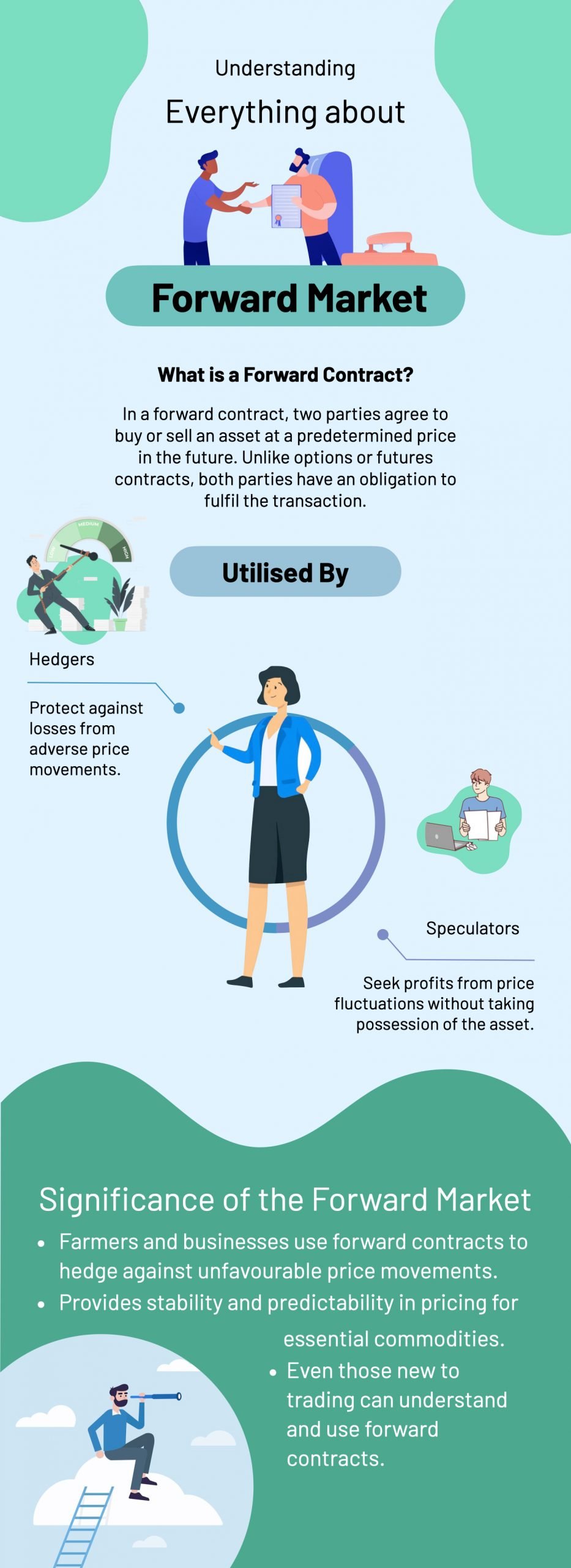Unlike the stock, derivatives or commodity markets, a forward market is not an exchange but an over-the-counter (OTC) marketplace for foreign exchanges, securities, interest rates and commodities. However, the term forward market is most often used in relation to the forex market.
It is a market where forward contracts are bought and sold for the purpose of hedging (protecting investments) or speculation (maximizing returns). Both forward and future markets in India are regulated by the Forward Markets Commission.
Above we gave you a simple forward market definition; below we will understand how forward contracts work in the forward market.
What is a forward contract?
In a forward contract, two parties agree to buy or sell an asset at a set price in the future. Unlike an options or futures contract, here both the parties in the transaction have the obligation to fulfill the transaction.
In option or future contracts, a buyer or seller can sell the contract before the expiration date and close his position. In a forward contract both parties have the obligation to deliver the underlying asset, whether its currency, commodity or any other securities. If you understand what a forward contract is, you should be able to understand what is forward market.
How a forward contract works?
To understand how a forward contract works and to understand forward market meaning, it will be useful to know who the participants are in a forward market. Forward contracts are primarily used by hedgers to offset losses and speculators to profit from price fluctuations.
Hedgers use the forward market to protect themselves from losses if the price of their products goes against their favour in the market. On the other hand, speculators are not keen to take possession of the commodity or currency but want to make gains by placing bets on price direction. Generally, forward contracts are used more by hedgers than speculators.
Let’s understand how it works with a simple example:
Example of a forward contract
Assume that you are a farmer who plans to harvest 10 tons of wheat next year. You know that you have to sell the wheat at Rs. 5,000 per ton to make a profit. Now, you have two options: You can either choose to do nothing and hope that your produce will fetch Rs. 5,000 when you sell it or lock in the prices for the future.
For that you may enter into a forward contract with a flour mill owner or a flour marketing company to sell wheat at Rs. 5,000 per ton after the harvest. In this way, you have protected yourself from the risk of decline in wheat prices. In the same way, the flour mill owner can also enter into a contract to lock prices so that he wouldn’t have to pay more for wheat after the harvest.

Why is the forward market important?
The forward market plays an important role in providing price support and protection to important sectors in the Indian economy. Forward contracts executed through the forward market are very simple forms of derivatives that even people without prior experience in trading can understand. Forward contracts allows participants to trade in a host of commodities, such as natural gas, oil, beef, electricity, orange juice, grain, precious metals and forex or foreign currency.
Difference between forward market and futures market
People new to investing and trading tend to confuse between the forward market and futures market. Here is a simple way to differentiate between the two.
Forward Market vs. Futures Market
| Basis | Futures Market | Forward Market |
|
Type of contracts |
Deals in future contracts |
Deals in forward contracts |
|
Size of contracts |
Standardized predetermined sizes or lots |
Contract sizes are tailored according to needs, not standardized |
|
Regulation |
Regulated by SEBI |
Self-regulated |
|
Risks |
Minimized by margin amount and exchange regulation. Moderate risk. |
Participants are not required to deposit a margin amount and there is no exchange to regulate transactions. High risk of default. |
|
Settlement by delivery |
Less than 2% of transactions |
More than 90%
|
Forward market by definition is not a centralised exchange and retail investors have limited access to it. Most of the transactions occur by cash or delivery and are more aligned for people who are directly involved in trading or producing the underlying assets.
However, as a retail investor, you can still trade in commodities and in the futures market by signing up with a reliable broker. Angel One, one of the largest, full-service retail broking houses in India, is the right place for equity, currency, commodity and derivative traders and investors. Don’t worry; we have experts to assist, guide and train you in every aspect of trading in various segments. Start with a free demat account today and start trading in 5 minutes!
Learn Free Stock Market Course Online at Smart Money with Angel One.

